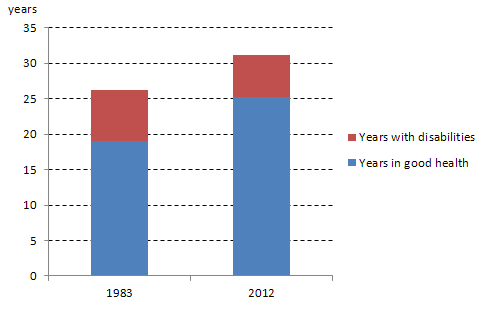Joop de Beer & Nico van Nimwegen (NIDI)
Horizon 2020 is the new program of the European Commission to stimulate research and innovation. It starts on 1 January 2014 and has a budget of over 70 billion euro. Horizon 2020 challenges the academic and business communities to work together with stakeholders to find innovative solutions for the great societal challenges that confront Europe. Population ageing is one of those challenges. Innovation is key to Horizon 2020. We discuss some of the linkages of demography and innovation.
Innovation is a main cause of population ageing: the strong increase in longevity across Europe can largely be attributed to medical and technological progress. This has both led to improvements in medical treatment and to an increase in wealth. While innovation can be seen as one of the root causes of population ageing, technical, medical, social and organizational innovations are now needed to turn population ageing from a challenge into an opportunity. On the labour market population ageing leads to an older and a potentially declining workforce. Here technological innovations are needed to increase labour productivity. Without acceleration of productivity growth, population ageing could lead to economic decline. But technological innovations will not be enough. To increase low participation rates of older workers in education and training, special programs to update older workers’ skills are needed in a lifelong learning perspective. Innovative education policies are needed too since adult education will only be effective if programs are attractive to adults. To make the fullest use of the potential of an older population for society at large, the promotion of active ageing is a crucial strategy. For an impression of the magnitude of this potential, consider the following: during the last 30 years, life expectancy at age 50 of Dutch men has increased by 5 years. These additional years are spent in good health; the number of years with disabilities has decreased.
Life expectancy of Dutch men at age 50

Active ageing includes labour market activities, such as working longer, but also involves volunteer work or providing informal care within or outside the family. Active ageing requires that older people remain healthy until older age. Health is crucial for active ageing and innovative (preventive) health policies and practices have an important role to play. Lifestyle is a major determinant of vitality and since, for instance, the increase in obesity at young and middle ages may well lead to a less fit older population in the future, innovative health promotion policies are called for. The effectiveness of preventive health campaigns promoting healthy life styles (no smoking, more physical exercise, healthier diets) leaves much to be desired. Innovative policies are needed taking into account that current policies aimed at the prevention of obesity may have the unintended effect of increasing the gap in health between the rich and poor: higher educated people who already have healthier life styles are more inclined to take notice of public health advice than the less well-off. Thus research is needed to develop innovative health promotion policies which are also effective in reaching those with unhealthy life styles.
An unintended effect of medical progress is the increase of the prevalence of chronic disease. Improved diagnosis leads to discovering diseases at younger ages, while better medical treatment results in a decline of fatality from chronic disease. Hence the number of people with a chronic disease is increasing. The challenge here is to remain active even when having a chronic disease. This calls for innovative actions to help prevent or delay disability from chronic disease such as new surgical procedures, physical therapy and the development of devices assisting people with physical impairments.
Social innovation is needed as well, for instance with regard to changing attitudes about ageing and older persons. A concrete example are the perceptions of employers about older workers which are a crucial factor in policies to activate older workers. Examples of innovative public policies include programs which flesh out and promote the benefits of an age-diverse work force which also involve a changing mind set of decision makers. Next to health, education is a key ingredient for active and healthy ageing policies. To preserve the employability of the workforce over the course of the – extending – working life, innovative programs, including re-skilling programs in a lifelong learning perspective are needed to cope with technological and organizational change where also job rotation provides ongoing work place learning.
Technology will be an be an important asset to alleviate the consequences of individual ageing and ICT may support independent living of ageing persons. The use of ICT, however, is still much lower among older age groups where ICT-skill levels are low, though increasing. New policies are called for to span the digital divide. As learning styles of older persons differ considerably from those of younger generations, innovative and ageing-proof technologies and appliances including for instance GPS-based orientation systems, robotics and ICT-based entertainment should be developed to support older people and to stimulate cognitive capacity.
Innovation is needed more than ever to turn population ageing from a challenge into an opportunity and from a problem into an asset. As a part of Horizon 2020, so-called Knowledge and Innovation Communities (KICs) are developed which should integrate education and entrepreneurship with research and innovation. The launching of a KIC for healthy living and active ageing in 2014 is a very welcome initiative and provides exciting opportunities for demographic research.
Joop de Beer & Nico van Nimwegen (2013), Population ageing calls for innovation, now more than ever. NIDI Web article 2013-03, December 2013.
